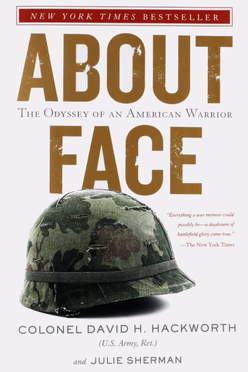About Face
The Odyssey of an American Warrior

A candid and rollicking memoir by a flawed man but gifted leader.
Hackworth proves a natural raconteur, transporting us to freezing battlefields, chaotic firefights, and drunken revelry. His story begins in the waning days of World War II, when, aged fifteen, he lies about his age to join the merchant marine.
This leads to an Army enlistment where he shines as an infantry soldier during the Korean War. After an injury lands him in a Japanese hospital, we get the first of many memorable Hackworth quotes. This one, when he dissuades an amorous Army nurse shaped like “a tackle for the Rams” by saying:
There are only two things in life that interest me. One is sex and the other is adventure, and you don’t offer either.
Hackworth’s dedication to the infantry soldier provides the through-line as he distinguishes himself on the Korean battlefield, ascends to command, and rotates in and out of combat.
As the years pass, the Army changes around him, transitioning from wartime to peacetime. His beloved NCOs find themselves squeezed out, replaced by commissioned officers with no combat experience. As the disconnect between the enlisted and commissioned widens, Hackworth struggles. The conflict in Vietnam offers hope the Army will turn around, but as the casualties mount Hackworth grows disillusioned and cynical.
This dissonance culminates in a televised interview with ABC, where Hackworth condemns the Army’s handling of the Vietnam war, thus ending his promising military career.
Along the way, Hackworth admits to multiple offenses. He chronicles how he covered up a missing machine gun, established an on-camp brothel, and frequented illegal poker games. Yet these violations proved in keeping with his character. When he broke the rules, he did so with his troop’s welfare in mind. The cover up kept a good man out of jail, the brothel protected against venereal disease, and the poker games funded luxuries for his troops.
This integrity proved key to his success as a leader. He would never ask a subordinate to do something he wouldn’t do himself. And they knew it. He valued his subordinate leaders and gave them freedom to operate in whatever manner proved most efficient for the task at hand. He warned of centralization, saying:
I’d seen it in Vietnam with Slam, and now even more clearly a the Pentagon. The closer a man got to the top, the more control he wanted over the smallest detail. He couldn’t let his underlings be completely in charge of anything; if they screwed up, he might pay the price with a bad ER or pass over at the promotions board. Yet at the same time, he needed those underlings, because without them he’d have no empire to command. And empire building was a human tendency the Army exhibited with great enthusiasm.
Indeed, after a stint at the Pentagon, he said:
If Sherman said war is hell, it was only because the Pentagon hadn’t been built yet.
These quips prove both amusing and insightful. Perhaps the most resonant:
An organization does well only those things the Boss checks.
And even when he’d exhausted his patience, and optimism had given way to cynicism, Hackworth proved pithy, saying:
To succeed in today’s Army one must be quick on his feet and dazzle all with shifty footwork.
This book surprised me. I expected something more abstract or bitter. Yet this story of a man’s love of combat neither glorifies nor condemns war. Rather, it celebrates the heroes and leaders who displayed the integrity Hackworth sought to emulate. The men we want to believe comprise our armed forces. And it condemns the careerists and detached bureaucrats eager to sacrifice men’s lives without having experienced combat themselves. He emerges with an interesting pro-combat, anti-war stance that sounds incongruous but proves compelling. Hackworth wasn’t a man for all seasons, but it’s shameful how the Army alienated him. Leaders of all kinds can benefit from his hard-learned lessons.
Reading History
- 2022Sep5MonAudiobook (Read by John Pruden)
Read over 8 Days
- 29 Aug 20224%
- 2 Sept 202223%
- 3 Sept 202253%
- 4 Sept 202281%
- 5 Sept 2022Finished